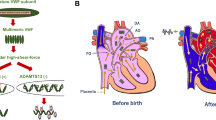Abstract
Recommended treatment for patients with primary antiphospholipid syndrome (APS) after a thrombotic event is long-term anticoagulation. Few patients with APS and previously positive antiphospholipid antibodies (aPL) may become negative over time. It is still not exactly known how to treat these patients when aPL become persistently negative. We described the follow-up of 11 primary APS patients whose aPL become persistently negative and in whom thromboprophylaxis was discontinued. The primary end-point was the recurrence of thrombosis in patients with previous thrombotic event and a first thrombotic event in women with previous obstetric APS. Ten (90 %) patients were female. Seven (64 %) patients had a history of deep venous thrombosis, two of them with pulmonary embolism, and four (36 %) women had recurrent miscarriage. Lupus anticoagulant (LAC) was the aPL most frequently detected (82 %). Two patients had both LAC and IgG anticardiolipin antibodies. No new thrombotic episode was observed after a median follow-up period of 20 months. Anticoagulation or antiaggregation could be discontinued in some peculiar patients with low-risk primary APS whose aPL become persistently negative. However, studies including a larger number of patients are required to confirm these results.
Similar content being viewed by others
References
Miyakis S, Lockshin MD, Atsumi T, et al. International consensus statement on an update of the classification criteria for definite antiphospholipid syndrome (APS). J Thromb Haemost. 2006;4:295.
Ruiz-Irastorza G, Crowther M, Branch DW, Khamashta MA. Antiphospholipid syndrome. Lancet. 2010;376(9751):1498.
Ruiz-Irastorza G, Cuadrado MJ, Ruiz-Arruza I, et al. Evidence-based recommendations for the prevention and long-term management of thrombosis in antiphospholipid antibody-positive patients: report of the 13th international congress on antiphospholipid antibodies. Lupus. 2011;20:206.
Martinez-Zamora MA, Peralta S, Creus M, et al. Risk of thromboembolic events after recurrent spontaneous abortion in antiphospholipid syndrome: a case-control study. Ann Rheum Dis. 2012;71:61.
Gris JC, Bouvier S, Molinari N, et al. Comparative incidence of a first thrombotic event in purely obstetric antiphospholipid syndrome with pregnancy loss: the NOH-APS observational study. Blood. 2012;119:2624.
Wijetilleka S, Scoble T, Khamashta M. Novel insights into pathogenesis, diagnosis and treatment of antiphospholipid syndrome. Curr Opin Rheumatol. 2012;24:473.
Martínez-Berriotxoa A, Ruiz-Irastorza G, Egurbide MV, et al. Transiently positive anticardiolipin antibodies do not increase the risk of thrombosis in patients with systemic lupus erythematosus. Lupus. 2007;16:810.
Tektonidou MG, Laskari K, Panagiotakos DB, Moutsopoulos HM. Risk factors for thrombosis and primary thrombosis prevention in patients with systemic lupus erythematosus with or without antiphospholipid antibodies. Arthritis Rheum. 2009;61:29.
Erkan D, Derksen WJ, Kaplan V, et al. Real world experience with antiphospholipid antibody tests: how stable are results over time? Ann Rheum Dis. 2005;64:1321.
Pengo V, Tripodi A, Reber G, et al. Update of the guidelines for lupus anticoagulant detection. Subcommittee on lupus anticoagulant/antiphospholipid antibody of the scientific and standardisation committee of the international society on thrombosis and haemostasis. J Thromb Haemost. 2009;7:1737.
Criado-García J, Fernández-Puebla R, López Jiménez L. Anticoagulation treatment withdrawal in primary antiphospholipid syndrome when anticardiolipin antibodies become negative. Rev Clin Esp. 2008;208:135.
Ruiz-Irastorza G, Hunt BJ, Khamashta MA. A systematic review of secondary thromboprophylaxis in patients with antiphospholipid antibodies. Arthritis Rheum. 2007;57:1487.
Rand JH, Wu XX, Quinn AS, Chen PP, Hathcock JJ, Taatjes DJ. Hydroxychloroquine directly reduces the binding of antiphospholipid antibody-beta 2-glycoprotein I complexes to phospholipid bilayers. Blood. 2008;112:1687.
Pengo V, Ruffatti A, Legnani C, et al. Clinical course of high-risk patients diagnosed with antiphospholipid syndrome. J Thromb Haemost. 2010;8:237.
Mahler M, Norman GL, Meroni PL, Khamashta M. Autoantibodies to domain 1 of beta 2 glycoprotein 1: a promising candidate biomarker for risk management in antiphospholipid syndrome. Autoimmun Rev. 2012;12:313.
Meijide H, Sciascia S, Sanna G, Khamashta MA, Bertolaccini ML. The clinical relevance of IgA anticardiolipin and IgA anti-β2 glycoprotein I antiphospholipid antibodies: a systematic review. Autoimmun Rev. 2012;. doi:10.1016/j.autrev.2012.08.002.
Staub HL, Bertolaccini ML, Khamashta MA. Anti-phosphatidylethanolamine antibody, thromboembolic events and the antiphospholipid syndrome. Autoimmun Rev. 2012;12:230.
Cervera R, Conti F, Doria A, Iaccarino L, Valesini G. Does seronegative antiphospholipid syndrome really exist? Autoimmun Rev. 2012;11:581.
Author information
Authors and Affiliations
Corresponding author
Rights and permissions
About this article
Cite this article
Coloma Bazán, E., Donate López, C., Moreno Lozano, P. et al. Discontinuation of anticoagulation or antiaggregation treatment may be safe in patients with primary antiphospholipid syndrome when antiphospholipid antibodies became persistently negative. Immunol Res 56, 358–361 (2013). https://doi.org/10.1007/s12026-013-8407-x
Published:
Issue Date:
DOI: https://doi.org/10.1007/s12026-013-8407-x




